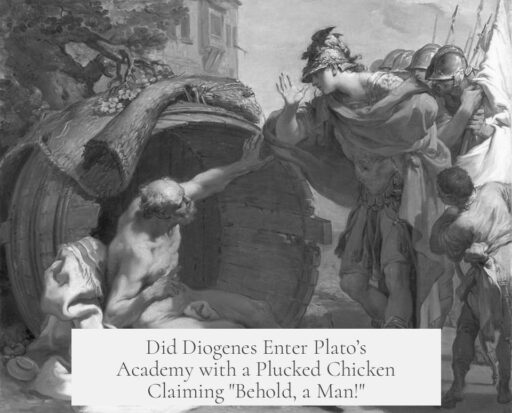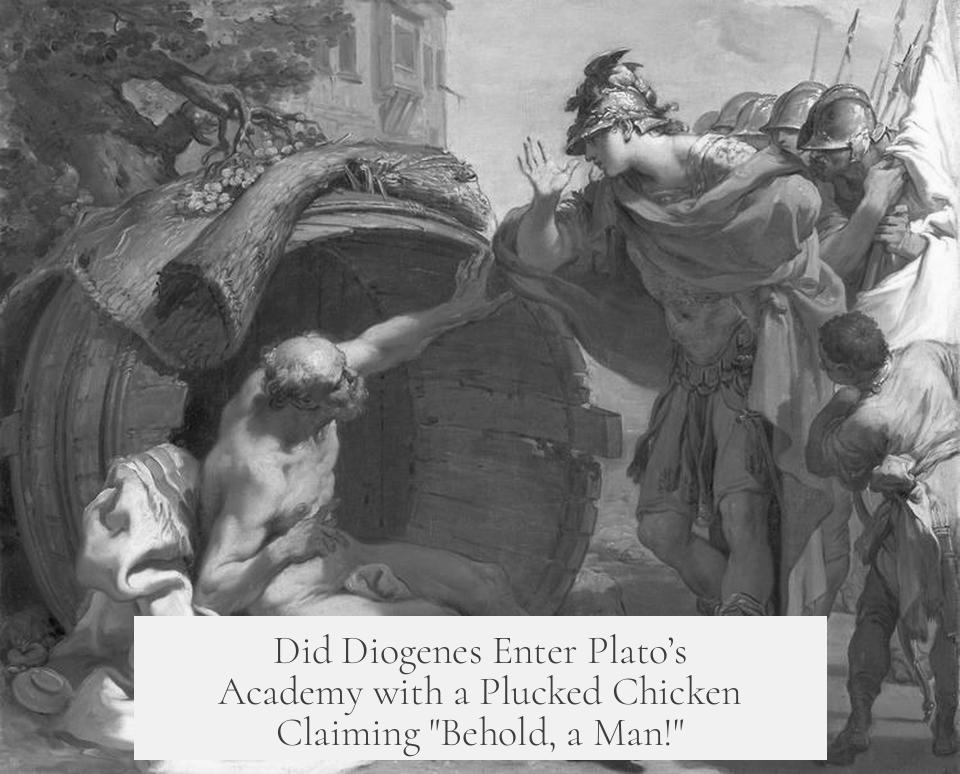There is no strong historical evidence that Diogenes actually ran into Plato’s Academy holding a plucked chicken, declaring “Behold, a man!” in response to Plato’s definition of man as a featherless biped. This popular anecdote originates mainly from later sources and is likely a satirical or illustrative story rather than a factual event.

The story first surfaces in the writings of Diogenes Laertius, who lived several centuries after Diogenes and Plato. Laertius recounts that Plato defined a man as an “animal, biped, and featherless.” To mock this, Diogenes supposedly brought a plucked chicken to Plato’s lecture and said, “Here is Plato’s man.” The addition “having broad nails” was then allegedly added to refine the definition. This version is the primary source for the anecdote but comes with notable caveats.
Diogenes Laertius is known for a credulous approach to philosophical anecdotes. He often compiled stories from diverse and sometimes unreliable sources without critical verification. It is improbable he had access to any original writings by Diogenes the Cynic, meaning the tales he reports could be distorted or invented by later admirers or detractors.
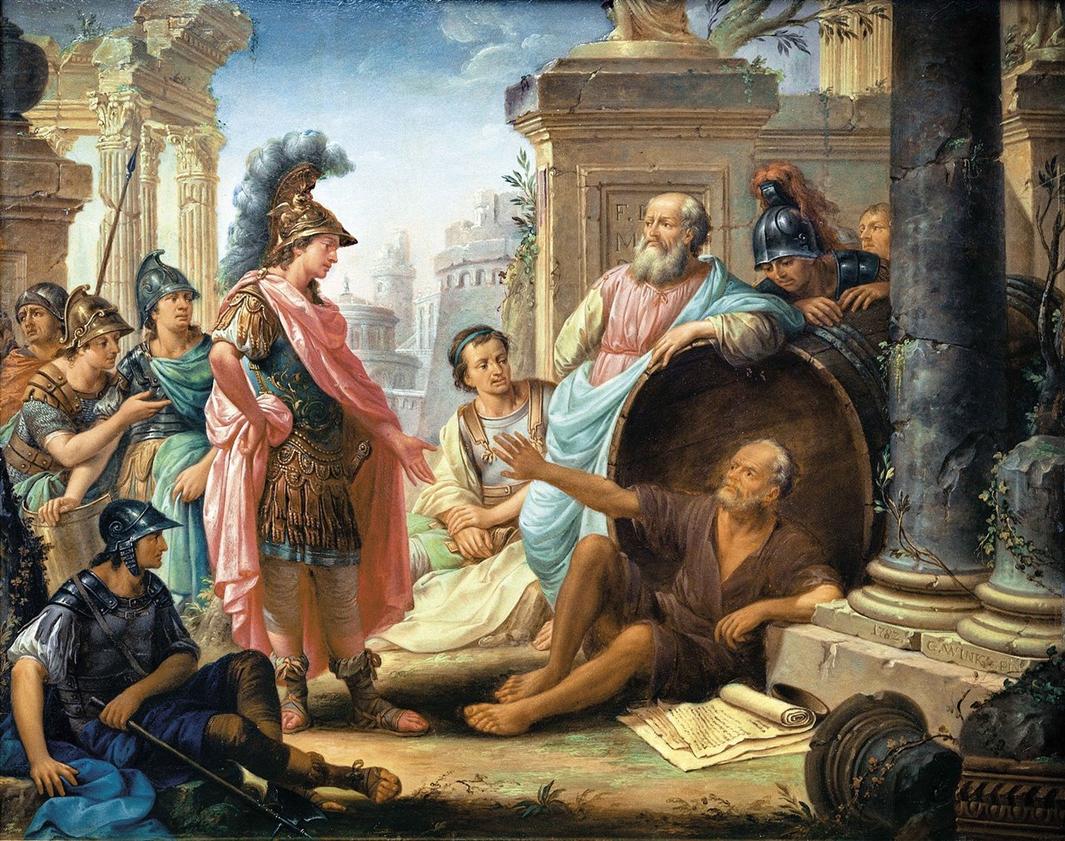
There is an absence of any contemporary references to this incident. Plato himself, though central to the story, never mentions Diogenes or the plucked chicken episode in his surviving works. Aristotle references Diogenes only briefly and off-handedly. Some scholars suggest Diogenes the Cynic may have arrived in Athens after Plato’s death, casting further doubt on direct interactions between them.
The anecdote fits the style of later satirical tales meant to highlight philosophical tensions. It contrasts Platonism’s abstract theorizing with the Cynic school’s biting, practical wit. Cynicism often mocked the intellectualism and social pretensions of Plato and his followers. The “plucked chicken” story aligns well with this tradition of pointed humor.
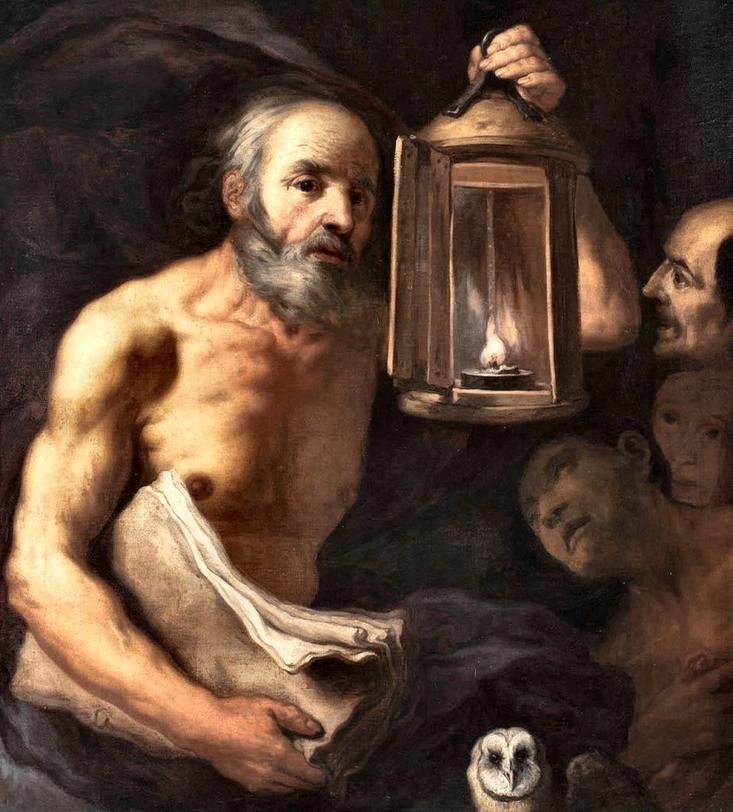
Plato’s original definition of man as a featherless biped appears in his dialogue The Statesman. This classification aimed to logically sort animals for philosophical discussion and was part of a larger argument about good governance. The “broad nails” addition, attributed humorously to Diogenes’ critique, does not appear in Plato’s text.
Regarding Diogenes, he cultivated an image of an anarchistic critic of social norms and pretentious philosophy. Stories of his confrontations with figures like Alexander the Great exemplify his provocative style. However, many witty sayings and pranks attributed to Diogenes are likely apocryphal or exaggerated. Like many famous ancient figures, he became a repository for sharp, memorable retorts that represented Cynic attitudes.
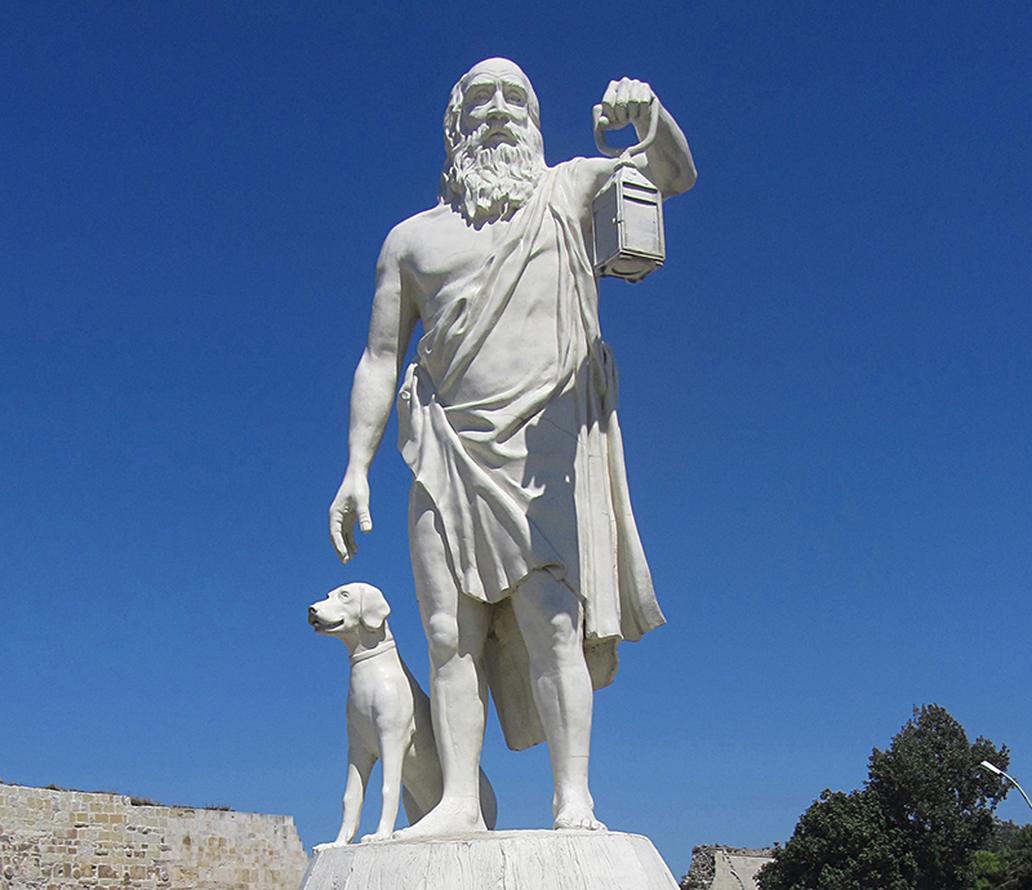
While the anecdote about the plucked chicken is widely known and often quoted, historians treat it cautiously. It serves as a symbolic tale illustrating the clash between two philosophical movements rather than a documented incident. The story illuminates how ancient philosophers used humor and sharp critique to challenge each other’s ideas, but it is not a verified fact.
| Aspect | Details |
|---|---|
| Source | Primarily Diogenes Laertius, centuries later |
| Contemporary Evidence | None in Plato’s or Aristotle’s works |
| Philosophical Context | Plato’s “featherless biped” is a logical classification from The Statesman |
| Historical Likelihood | Unlikely; likely a humorous, rhetorical story |
| Philosophical Contrast | Illustrates tension between Platonism (theory) and Cynicism (practical critique) |
Key points to remember:
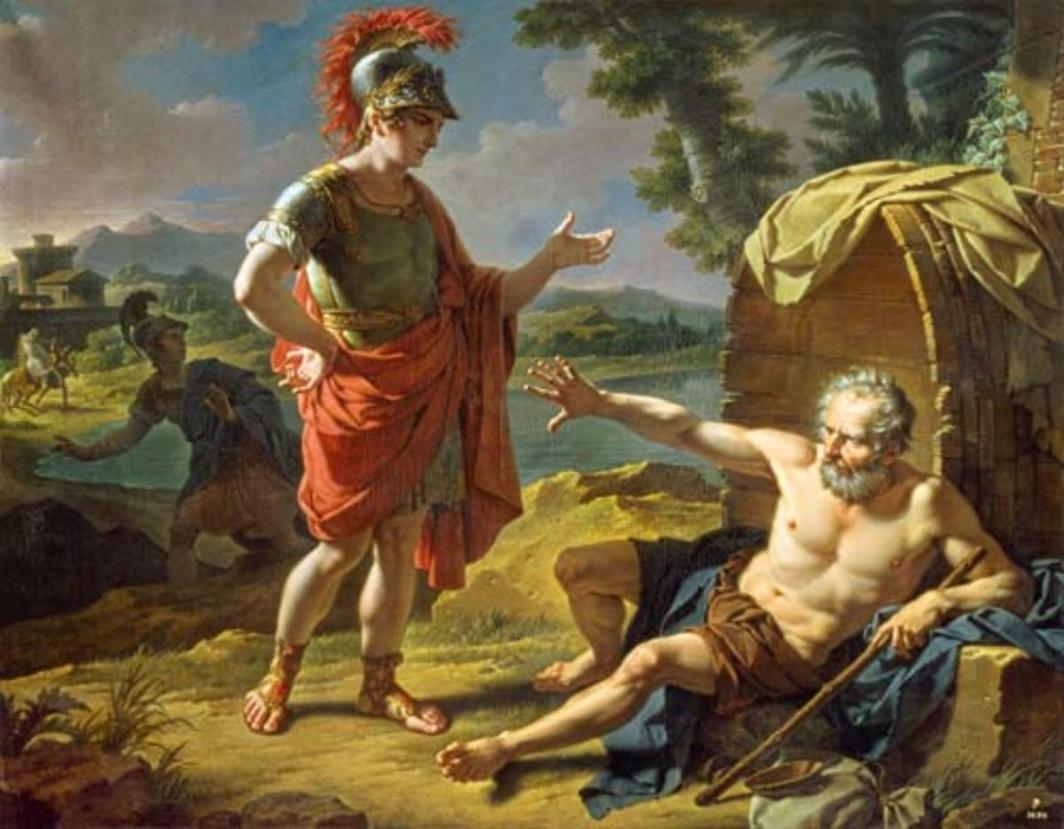
- The plucked chicken story is not verified by contemporary sources and likely postdates both Plato and Diogenes.
- Diogenes Laertius’ account is the main source but is considered unreliable and anecdotal.
- Plato’s definition of man as a featherless biped is a genuine philosophical classification from The Statesman.
- The anecdote serves as satirical commentary reflecting Cynic criticism of Platonic philosophy.
- Modern scholarship treats the tale as a folkloric illustration rather than a historical incident.
Did Diogenes Really Run into Plato’s Academy with a Plucked Chicken Saying “Behold, a Man!”?
Short answer: Probably not. But the story is so delightfully vivid and rich in philosophical spice that it keeps popping up in discussions about ancient philosophy, Cynicism, and yes, even chickens without feathers.
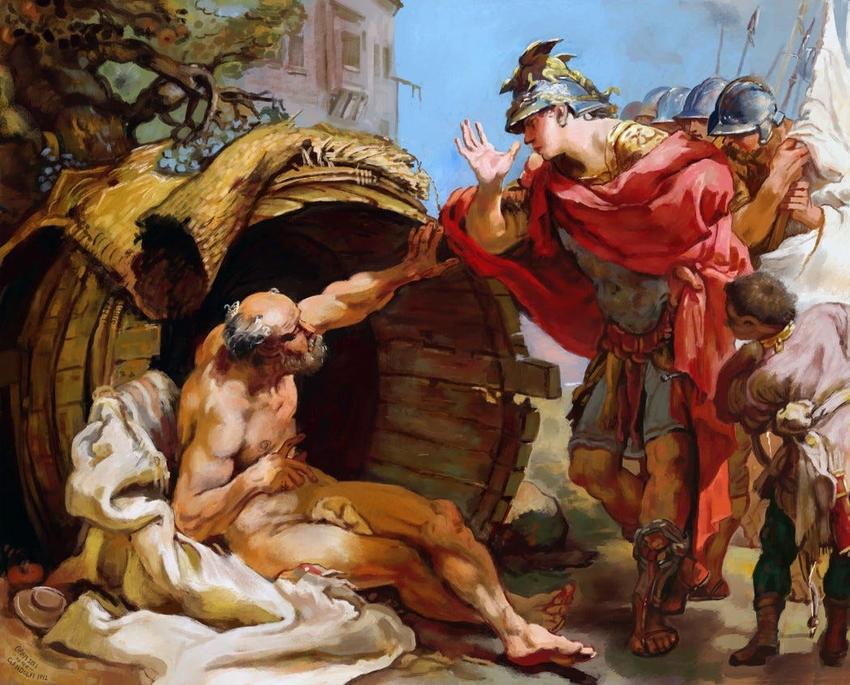
Let’s unravel this quirky tale and see what’s fact, what’s fiction, and how this featherless bird flew into philosophical folklore.
Where Did This Tale Originate?
The famously cheeky anecdote comes from Diogenes Laertius, a third-century biographer of philosophers. In his Lives and Opinions of Eminent Philosophers, he recounts how Plato, in his lectures, defined “Man” as a featherless biped. Then, according to Laertius, here comes our bad-boy philosopher, Diogenes of Sinope, striding into Plato’s lecture hall carrying a plucked chicken, triumphantly declaring, “Here is Plato’s man.”
“Plato had defined Man as an animal, biped and featherless, and was applauded. Diogenes plucked a fowl and brought it into the lecture-room with the words, ‘Here is Plato’s man.’ In consequence of which there was added to the definition, ‘having broad nails.’”
That little jab prompted Plato’s followers to tweak the definition by adding “having broad nails,” as if that could save face against the featherless chicken assault.
How Much Can We Trust Diogenes Laertius?
Before handing out medals for the best philosophical prank, it’s important to consider who reported this story. Diogenes Laertius wrote several hundred years after Diogenes of Sinope lived. He compiled many anecdotes and sayings, some undoubtedly accurate, others more like ancient gossip with a sprinkle of exaggeration.
“Laertius has a reputation for being a bit credulous, and not particularly philosophically switched on.”
He never had access to original writings by Diogenes, if indeed any existed at all. So, while the story is entertaining, its credibility is way less than a modern witness report.
Did Plato Ever Respond to This Taken-A-Legg-Story?
Here’s where historical skepticism comes in. If Diogenes had really crashed Plato’s Academy with a naked chicken to mock the definition of “man,” you’d expect Plato to write something about it, right? Some kind of philosophical clapback or mention anywhere in his many dialogues.
But—surprise!—there’s no hint of such an incident in Plato’s works. Plato remains silent.
Aristotle, who lived a generation after Plato, barely mentions Diogenes. And some historians even suggest that Diogenes might not have arrived in Athens until after Plato died, which makes the whole story even more fishy.
“One suspects, if this featherless biped thing was a well-known anecdote in Plato’s lifetime, that Plato would have addressed it in his writing in a way that attempts to make Diogenes look foolish.”
So the silence from Plato’s side is deafening. It strongly hints that this story probably floated around later, like philosophical folklore.
The Philosophical Backdrop: What Did Plato Really Mean by ‘Featherless Biped’?
Plato does talk about bipeds without feathers in a few dialogues, notably in The Statesman. This definition is part of a broader philosophical effort to classify animals and humans systematically. Plato divides animals into quadrupeds and bipeds, then further divides bipeds into feathered and featherless.
“I say that we should have begun at first by dividing land animals into biped and quadruped; and since the winged herd, and that alone, comes out in the same class with man, should divide bipeds into those which have feathers and those which have not…”
Far from being a lazy or simplistic definition, it served a larger purpose in Plato’s political philosophy. The dialogue argues that humans need a wise ruler, like a “statesman and ruler,” to herd them rightly, just as one would herd animals.
Interestingly, Plato never mentions “broad nails.” That addition seems like an afterthought, probably a comical tweak to patch the awkwardness set off by Diogenes’ plucked chicken stunt.
Meet Diogenes: The Original Cynic Punk Rocker
Diogenes of Sinope was kind of the punk rock philosopher of ancient Greece. He rejected social conventions, norms, and pretensions. Known for his anarchistic, rebellious streak, Diogenes didn’t much care for Plato’s fancy debates or political theories.
He was famous for weird and bold antics—living in a barrel, defying social etiquette, and amusingly clashing with powerful figures (Alexander the Great supposedly asked if he could grant Diogenes any wish, and Diogenes cheekily replied, “Yes, stand out of my sunlight”).
This reputation makes the featherless chicken story fit the character well. But it also means we should consider that many witty quips and prank stories later got pinned on Diogenes because he symbolized Cynic boldness and irreverence.
“Just as the Pythagoreans claimed several philosophical ideas and mathematical findings to Pythagoras, it’s likely that there were plenty of funny ripostes… put into the mouth of Diogenes.”
Was the Chicken Story Born as Satire?
Most scholars today think the tale was likely concocted by someone later—not to record a factual event, but as satire. Its purpose is clear: poke fun at Plato’s abstract philosophical systems by showing a Cynic biting back with blunt common sense and humor.
This fits a pattern seen elsewhere, like Aristophanes’ The Clouds, which lampooned Socrates. Philosophical squabbles often invited ribbing and caricature from rivals. The chicken story serves as a witty illustration of how Cynics saw Platonists as overcomplicating human nature.
“In all likelihood, it’s a funny anecdote created by someone later to illustrate the differences between Platonism and Cynicism.”
Why Does This Story Matter Today?
Beyond the laughs, this story highlights how philosophical definitions can become too abstract to be practical. Plato’s “featherless biped” is clever but missing what really makes a “man” human—culture, rationality, ethics—things feathers or nails don’t capture.
Diogenes’ prank mocks this reductionism by pointing out you could pluck a chicken and call it “man” based on that simple definition. It’s a cautionary tale about oversimplification in philosophy.
Moreover, the story teaches us to examine sources carefully. Ancient anecdotes, like urban legends today, mix fact, humor, and political commentary. Not everything that entertains is historic truth.
So, Did Diogenes Really Carry a Plucked Chicken Into Plato’s Academy?
Probably not. The tale almost certainly emerged centuries after both men lived. It’s a clever, humorous vignette that illustrates clashes between two philosophy schools—Cynicism’s skepticism of abstract theorizing versus Platonism’s ideal forms.
The lack of contemporary sources or Plato’s acknowledgment, plus Laertius’ questionable reliability, strongly suggest it’s just that: a story.
Still, it’s also a rock-solid reminder: precise definitions matter. And if your definition of “man” fits a hairless chicken, maybe you need to reconsider your philosophy.
If You Want to Think Like Diogenes Here’s a Tip:
- Question accepted definitions boldly.
- Use humor to expose pretension.
- Don’t be afraid to make your point visually. (Just maybe swap the chicken for a less slimy prop.)
- Recognize the value of practical, lived wisdom over dry, hypothetical categories.
After all, philosophy isn’t just about neat definitions. It’s about how we live those ideas in the real world.
Curious for More?
If the idea of philosophers being surrounded by legends and lore tickles your curiosity, check out this excellent discussion on how we know what we know about ancient thinkers:
In the end, whether or not a featherless chicken strutted into Plato’s academy, the story helps us think critically about philosophy, history, and how legends shape our understanding of the past.
